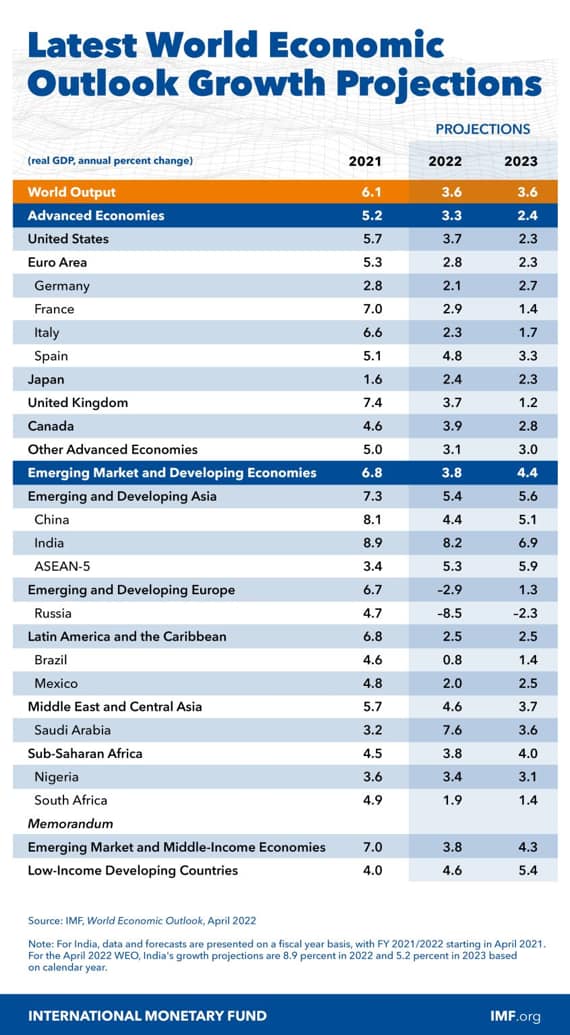Stressing that the war sets back the worldwide economic recovery, the Fund also trimmed its global growth projection for 2022 by 80 basis points from the earlier estimate to 3.6%.
The IMF projects the global economy to slow to 3.6% in 2022 and 2023, largely reflecting the direct impact of the war in Ukraine and its global impact. More in the latest World Economic Outlook. IMF.org/WEO-apr22 #WEO
IMF Growth Projections: 2022
USA![]() : 3.7%
: 3.7%
Germany![]() : 2.1%
: 2.1%
France![]() : 2.9%
: 2.9%
Italy![]() : 2.3%
: 2.3%
Spain![]() : 4.8%
: 4.8%
Japan![]() : 3.3%
: 3.3%
UK![]() : 3.7%
: 3.7%
Canada![]() : 3.9%
: 3.9%
China![]() : 4.4%
: 4.4%
India![]() : 8.2%
: 8.2%
Russia![]() : -8.5%
: -8.5%
Brazil![]() : 0.8%
: 0.8%
Mexico![]() : 2.0%
: 2.0%
Saudi Arabia![]() : 7.6%
: 7.6%
Nigeria![]() : 3.4%
: 3.4%
South Africa![]() : 1.9%
: 1.9%
The International Monetary Fund (IMF) on Tuesday scaled down its FY23 growth forecast for India by 80 basis points (bps) from its January projection to 8.2%, as it underscored the ripple effect of the Russia-Ukraine crisis on net oil importers and their aggregate demand.
Stressing that the war sets back the worldwide economic recovery, the Fund also trimmed its global growth projection for 2022 by 80 basis points from the earlier estimate to 3.6%. In its latest World Economic Outlook report, the multilateral body cited a severe double-digit drop in GDP for Ukraine and a steeper contraction in Russia, along with worldwide spill-overs through commodity markets, trade and financial channels for the downward revision. It warned that these forecasts are fraught with heightened uncertainties, with risks tilted to the downside.
The IMF also lowered its FY24 growth projection for India by 20 bps to 6.9%. Global growth will also drop by 20 bps in 2023 to 3.6%.
“Notable downgrades to the 2022 forecast include Japan (0.9 percentage point) and India (0.8 percentage point), reflecting in part weaker domestic demand—as higher oil prices are expected to weigh on private consumption and investment—and a drag from lower net exports,” the IMF said.
Given the elevated energy prices, it estimates India’s inflation to inch up to 6.1% in FY23 from 5.5% in FY22. Similarly, the country’s current account deficit is projected to rise to 3.1% in the current fiscal from an estimated 1.6% in FY22 before settling at 2.7% in FY24.
Of course, India will still remain the world’s fastest-growing major economy, ahead of China, which is likely to record real growth of 4.4% and 5.1% in 2022 and 2023, respectively. Moreover, its inflation outlook is still much better than that of developing countries, which, together, will likely witness price pressure rising to as much as 8.5% in 2022. Inflation in even advanced economises is projected at an elevated level of 5.7% in 2022.
The Fund has also slashed its growth projections for world trade volume by 100 bps and 50 bps in 2022 and 2023, respectively, to 5% and 4.4%. It will also weigh on India’s bid to build on its stellar export performance in FY22. Global trade volumes had risen by 10.1% in 2021, supported by an industrial resurgence in advanced economies in the aftermath of the pandemic.
The Ukraine war, the Fund said, has dealt a double whammy: while it will serve to reduce global economic growth, it will also add to inflation. Elevated price pressure will complicate the trade-offs central banks face between curbing inflation and protecting growth. As key central banks tighten policy, interest rates are set to rise, exerting pressure on emerging market and developing economies. Authorities should also be vigilant about private sector vulnerabilities to rising interest rates, it added.
Meanwhile, fuel and food prices have increased rapidly. Many poor and developing countries, which have limited fiscal policy space to cushion the impact of the war on their economies, will suffer, as the Ukraine war adds to the economic strains wrought by the pandemic.
On top of this, the recent lockdowns in key manufacturing and trade hubs in China can potentially compound supply-chain disruptions elsewhere.
Beyond 2023, global growth is projected to drop to about 3.3% over the medium term (from 3.6% in 2022 and 2023).
Interestingly, the IMF pitched for carbon pricing and fossil fuel subsidy reform, which, it said, could also help with the transition to a cleaner mode of production, less exposed to fossil fuel prices. This is “more important than ever in light of the fallout of the war on the global energy market”, it added.
https://www.financialexpress.com/economy/imf-trims-fy23-india-forecast-to-8-2/2497048/





